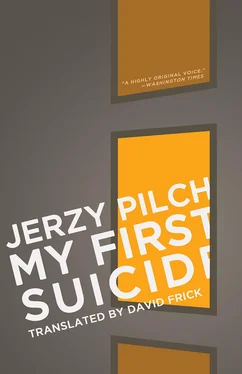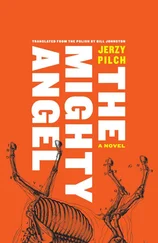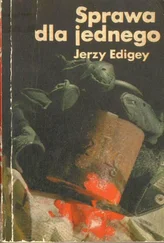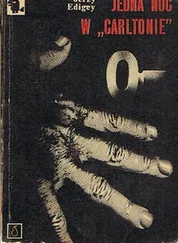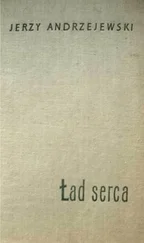And late, very late in the evening, Grandma Zuzanna will return home under heavens so star-strewn it was as if they were covered with snow. The cart goes calmly, the crowns of the trees almost bright, the clatter of the river and the great quiet over the mountains. Fuks pulls up to the gate by memory, a shadow rises from the bench standing before the front entry, runs up to the britzka, and offers her a firm hand, holds her a second longer, presses greedily, knows that he can. God is on his side.
IV
Honor to the Lord on High and thanks be to His grace! No longer can the power and might of Evil bring us doom! Lord Jesus, this is all true! You are! He is! Everything that my Grandpa, Andrzej Pech, taught in Sunday School, religion, and confirmation class — it’s true! God listens to prayers! His prayers were heard. After a year of imploring, his beloved was finally widowed. God has given a sign. No, God hasn’t given a sign. God has given significantly more — God has killed her husband, God has left her with a small child, God has pushed her into his arms.
His arms were ready for the labor of life. They helped her get down from the britzka, then they skillfully unharnessed Fuks, guided him to the stable, and poured out some oats. He returned to the courtyard paved with river stones, but she was no longer there. A yellow light fell from the great window. He glanced up. The edge of the roof under which he was to spend the rest of his life was sharply silhouetted, the heavens were white with stars. He walked all around the house. In her room, which faced the garden, it was already dark. She hadn’t turned on any of the lights, she had felt a surge of exhaustion so terrible, as if she were about to lose consciousness. She undressed in the dark, blindly threw her skirt, blouse, and corsette on Gustaw’s bed. She fell asleep with a light heart. Only just before falling asleep did she recall the hand offered to her as she got down from the cart, and then the skillful unharnessing of Fuks. “Why does that postal clerk feel so much at home?” she thought and, fortunately, tumbled into the deep well of sleep. Fortunately, because if she had begun to search for divine signs in this question, she could have gone mad. There is no reason to exaggerate about the divine signs. They are everywhere. In any case, they were there in the question she asked before she fell asleep: “Why does that postal clerk feel so much at home?” He had helped her down from the cart, and a year later she married him.
V
The photo from the second wedding party hangs lower, it is much clearer, and I look at it much more often. There are significantly fewer guests, not even twenty. Grandma Pech is again wearing Silesian dress, Mila again sits on her left with uncanny Pospiszil. They look exactly the same as in the first photo. The strangest of all is the fact that the elder Brannys also look exactly the same. At the wedding party of their son, they look exactly like they do at the wedding party of their widowed daughter-in-law. No change in facial expressions. Between the first and the second photograph, they had lost their first-born son. Now a woman, a stranger to them, who had been his wife, is marrying a postal official, to whom she would bear children under their roof, but you can’t see any of this in their faces. Perhaps because they are just as gloomy at the first wedding party as at the second.
Heavenly musicians play and angelic choirs sing for the groom. He listens to them, dressed in a tailcoat with silk facing. He has crossed his legs in a worldly manner, his shoulder touches Zuzanna’s shoulder, no further miracles are necessary. But in order to honor that miracle, he had Master Potulnik sew him a tailcoat. And he looks out of this world in it. There is no darkness in the background, nor are there evil signs. One dark window foretells how much misfortune is allotted to each.
The background is a white wall, behind which an ocean of objects reaches as high as my shoulders. Piles of prewar newspapers will be like lighthouses, decaying dresses and jackets like shifting sand dunes. Chowderhead the cat will go carefully along the treacherous bank, over which I will fish out from the depths occult novels and forbidden romances. In the middle, snatched up by a vortex, a golden trumpet — which came from who knows where the day after the festivities — circles in a pillar of sunlight. There I would find wooden heads from a puppet theater; there, one day, would come to the surface the skeleton of a leviathan completely plastered with fantastic account books; there I would come upon the menu from Roth’s tavern.
Diving in there took courage, but once you got down below, once you passed the shoal of Austrian coins, the keys to long-forgotten doors, spare parts for all the mechanisms in the world, once you had gone through the darknesses, and finally through the thickest layers strewn with mothballs, as low as possible — then you could see the white outlines of a sunken city: the ruins of marble counter tops, a gigantic scale, an amazing tree stump, an incredible ax, hooks bared and incomplete like the fangs of a mammoth. Even today, it is with the greatest difficulty that I realize that my Atlantis was a prewar butcher shop. Business was still booming during the war. No one ever spoke about it, but supposedly things were going well, even very well. The Germans had taken Roth and his entire family. There was less competition.
The last clients were soldiers of the Red Army. They rode down into Wisła through the Kubalonka Pass, just like the Wehrmacht, except that they came on horses. Grandpa Pech used to say that they had been fortunate enough to get an exceptionally honorable unit. They wanted to pay for everything, but they didn’t have any money. And you could see that they were hungry: at the very sight — at the very scent — of sausage they started shaking. No wonder — come war, come occupation, we always had sausage. One had a Turkmen kilim or a Kyrgyz carpet strapped to his saddle, or perhaps a Persian rug, in any case an amazing fabric in a pagan design. But it was out of the question, he wouldn’t give it up. He jabbers something feverishly, you could guess that he wants to get to Berlin with it, but probably not in order to hoist a colorful banner on the Brandenburg Gate, rather in order to return from Berlin with this treasure to Alma Ata, or God knows where. It was out of the question, he wouldn’t give it up, he wouldn’t give it up for any sausage. He wouldn’t give it up for anything. Not for anything in the world. Grandpa went off to his hiding place and returns with two quart bottles of moonshine. The moonshine has the same color as Mila’s prewar pepper vodka. The comparison means nothing to the stubborn Bolshevik, and he continues to shake his head no, although no longer with the same conviction. But his buddies, unusually honorable Soviet soldaty , were in favor of the transaction. They attacked him furiously. It was as if the horses had caught the smell, they began to snort. Finally, the kamandir himself issued a prikaz : let there be a strengthening in Polish-Soviet trade relations. And so there was. They each got a ring of sausage all the same. They ate, they drank, and off they went. And the marble countertops, tree stump, scales, hooks, and gigantic ax slowly began to sink to the bottom.
VI
The older Brannys, one after the other — it was still during the German occupation — died of distress, in other words, a natural death. “Mother supposedly heard that there was a knock, once, twice. I didn’t hear anything,” Grandpa Pech’s blood didn’t yet boil on account of the signs that were constantly coming to Mother , but he was already jealous of them. In accepting the fact that one amazing miracle had occurred in his life, and not expecting any further miracles, not even small ones, he had probably committed an error. He didn’t lose faith in God, but it is not so much faith as life itself — if it is not strengthened by signs — that weakens. “I don’t need any divine rumblings. Mother hears all the rumbling of this world and the next for me,” he repeated with with a sneer, although in the word “Mother” there was the least amount of sneering. Liberated from the majority of the local customs, he was liberated from the dreadfully suicidal constant “ Mother- ing” only by his intonation, but in my Lutheran parts even that is quite a lot.
Читать дальше
